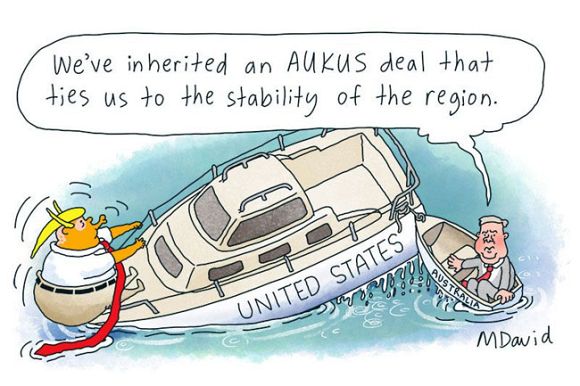Australia needs a new and independent defence policy, which isn't reliant on the United States, writes Bevan Ramsden.
THERE HAS BEEN a dramatic change in our strategic circumstances. The United States' reliability has been found wanting.
This provides both a challenge and an opportunity. We now need an alternative defence policy to safeguard our territory and enable the pursuit of peace in our region as an independent and responsible country.
The U.S. Administration under Trump has demonstrated, in a very short time, that:
- raw self-interest drives the United States;
- alliances can be sacrificed at short notice; and
- its alliance partners are not exempt from punitive tariff impositions — all in U.S. self-interest.
Australia is now faced with an unpalatable truth: we cannot rely on the U.S. to come and rescue us in times of danger. Our alliance with the U.S. is not reliable — if indeed it ever was. However, lazy and subservient Australian leadership has clung to this “article of faith” — that the United States will always protect us in a time of need. We have adopted defence policies based on that belief.
The stark reality is that this belief is baseless and recognising this has thrust to the fore the need for an alternative defence policy to meet our security needs. The Greens have responded to the situation with their version of an alternative defence policy.
Greens defence spokesperson Senator David Shoebridge said:
For decades, the major parties have based Australia’s defence policy on dependence and integration with the U.S. military.
This was a mistake. Our defence policy shouldn’t be based on Donald Trump coming to our rescue. Australia cannot continue to waste money on multi-billion dollar U.S. weapons platforms, designed not to defend Australia but to supplement Donald Trump’s military.
In order to seriously decouple the Australian Defence Force (ADF) from the U.S. and proudly take an independent foreign policy stance, we need to develop sufficient sovereign capabilities.
Another community organisation, the Independent and Peaceful Australia Network (IPAN), has spent years developing an alternative defence policy for an independent Australia. Its policy, finalised and adopted on 24 March 2025, can be accessed here.
Whilst there are similarities between The Greens' and IPAN’s policies, IPAN assumes that a fully-fledged alternative defence policy can only be implemented when Australia has broken from the U.S. alliance and is free to pursue an independent foreign policy.
The key features of IPAN’s alternative defence include:
- the recall of all ADF personnel to Australia where their role would be confined to the defence of Australia’s territory including its approach waters; and
- the ADF would not be deployed to wars overseas except for involvement in United Nations peacekeeping operations, where appropriate.
The first line of defence would be diplomacy with the diplomatic service given that differences with other countries, as well as the allocation of resources, ought to be resolved based on equality and mutual respect.
The IPAN concept would embrace a policy based on the principle of “non-nuclear, armed neutrality” — meaning that Australia would have no involvement in any wars between other countries. It would prevent Australian territory from being used in such wars.
This would mean:
- ending foreign military bases on Australian soil, including Pine Gap and North West Cape Submarine Communications Station;
- sending the U.S. Marines in Darwin home; and
- cancelling AUKUS and the Force Posture Agreement.
The Greens have stated the need for a sovereign Australian defence industry to provide hardware support for a defence force. IPAN agrees with this need but stresses that this industry must be publicly owned and hence under government control. Privately owned defence industry corporations (military-industrial complex, also known as MIC) have profited hugely from the public purse.
There is no place for a privately owned military-industrial complex in IPAN’s vision.
Opponents of an independent defence force argue that it would be very costly and would require a significant increase in military spending. A realistic assessment would prove the opposite. In fact, far less would need to be spent on a truly independent defence force, enabling the public purse to better finance health, education, affordable housing and addressing the climate crisis.
The Swiss, for example, have practised neutrality safeguarded by an independent defence force for years. Switzerland's defence spending, according to the Stockholm Institute, was 0.7 per cent of its GDP in 2020. Australia’s defence spending in 2019-2020 was 2.1 per cent of the GDP — three times as much.
Times have changed. There is recognition that we need to stand on our own feet as a country and look after ourselves. This is a step towards a truly independent and peaceful Australia and should be warmly welcomed.
Bevan Ramsden is an ex-telecommunications engineer and a long-time peace activist who advocates for Australia’s independence. He was a member of the coordinating committee of the Independent and Peaceful Australia Network (IPAN) for a number of years and is the editor of its monthly publication, 'Voice'.
 This work is licensed under a Creative Commons Attribution-NonCommercial-NoDerivs 3.0 Australia License
This work is licensed under a Creative Commons Attribution-NonCommercial-NoDerivs 3.0 Australia License
Support independent journalism Subscribe to IA.














